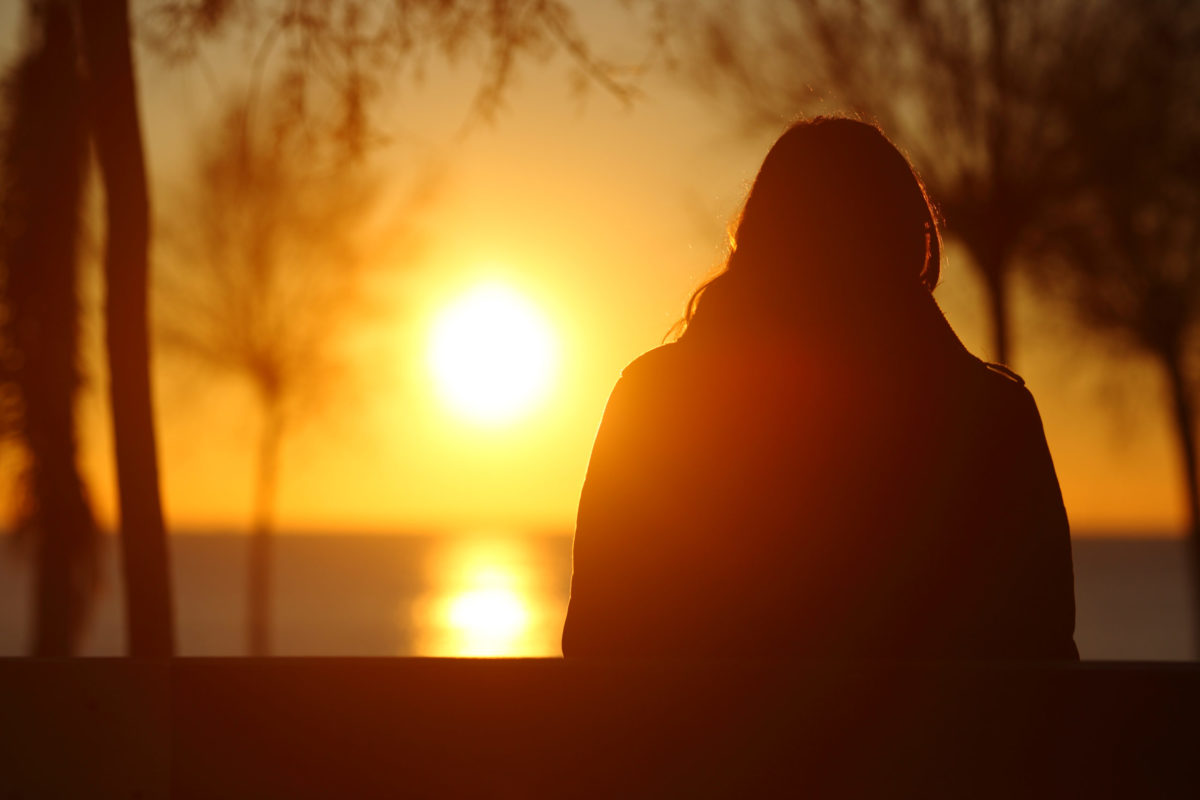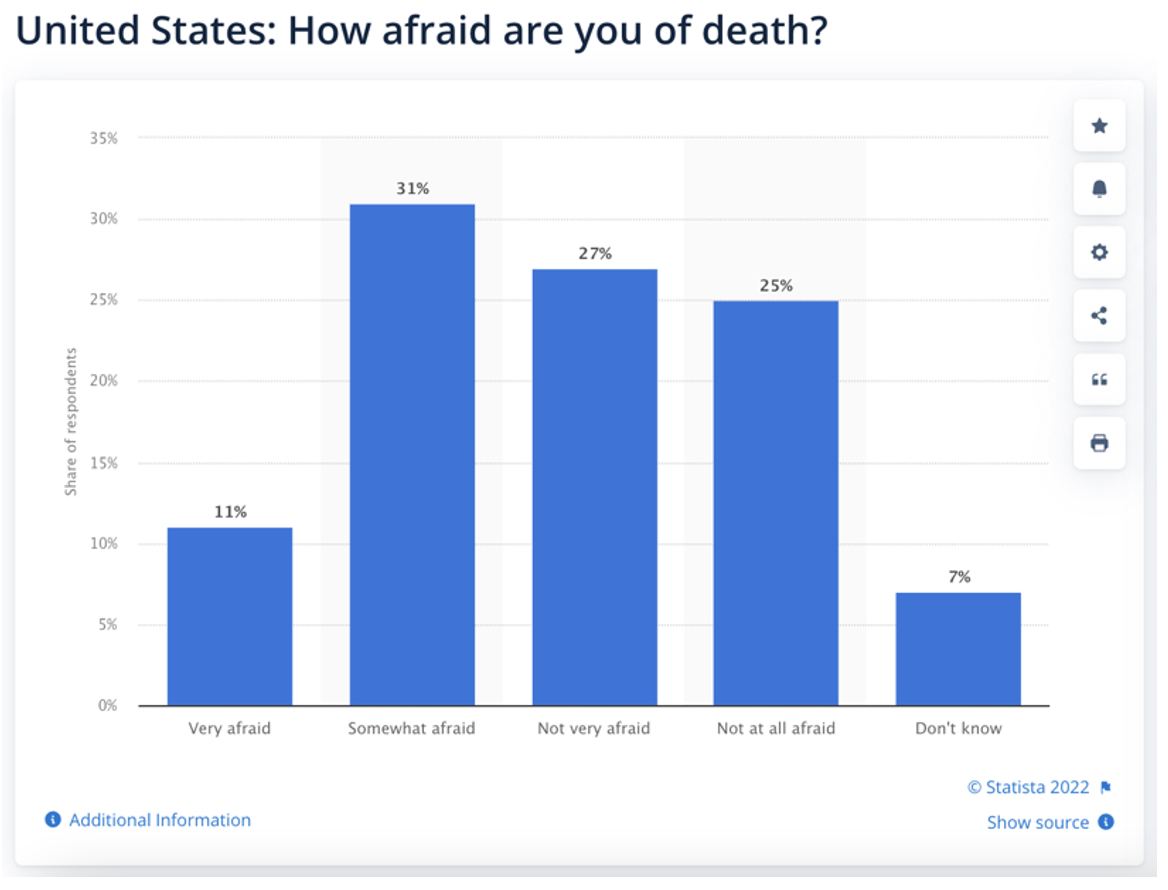When it comes to death, everyone’s feelings are different.
Some people are very afraid. Others aren’t at all. And a decent number of Americans — 7% — say they don’t know how they feel about death at all.
“It’s difficult to acknowledge our own deaths because no one wants to dwell on something that’s inevitable but also unknown,” says Sherry Campbell, founder of Welcome Home of Chattanooga, a sanctuary for people with critical illnesses. “But death doesn’t have to be a source of fear. The more we consider death thoughtfully and learn to talk about it with the ones we love, the better prepared we’ll all be when that day comes — for ourselves or our loved ones.”
7 things you may not know about death
1. More than half of people don’t fear death
Studies show that 52% of people say they aren’t afraid of death, while 42% report fearing death to some degree.
1 in 4 Americans say they’re not afraid of death at all.
Source: Statista
2. Women are more afraid of death than men are
This may be because women are more likely to admit a fear of death, or because women are deeply concerned about what will happen to their families after they die.
3. 65% of Americans say the death of loved one is their greatest fear
After the pandemic, a 2021 study showed that Americans’ top fears are:
- Death of a loved one
- A loved one becoming seriously ill
Sherry: One generous, meaningful thing we can all do for our families is to make plans for ourselves for serious illness. For example, my family knows where to find my health care wishes if I’m ever unable to speak for myself. And those wishes state that I want a room with plenty of windows, pictures of family, my cats, and music! We tend to think of discussions about death and illness as inherently sad, but they don’t have to be — a little bit of planning can have a powerful effect.
4. Children start fearing death around age 6
Kids often start to fear death around age 6 or 7. Experts believe this happens because, to them, death is very black-and-white. They don’t yet have religious beliefs or defense mechanisms like adults do, which can give them the sense that death is a vast, empty state of nothingness.
5. The young fear death more than the old
Studies show that Americans’ fear of death tends to decline as we age. It typically plateaus around age 50 for females and age 60 for males. Some studies even show that the fear of death is likely to peak in a person’s 20s, after which it declines.
6. Religion doesn’t affect a person’s fear of death
Most research on fear of death shows no link at all between religion and fear of dying. In fact, 18% of the studies found that religious people were more afraid of death than non-religious people. However, most studies show that the people who fear death the least are the very religious and atheists.
Sherry: Many of the people we serve at Welcome Home struggle with past experiences of religion, or mistakes they’ve made in the past that lead them to worry about punishment in the afterlife. Others find great comfort in talking with chaplains who provide important spiritual support in hospice or in the hospital. The important thing is that people have the option of getting the spiritual support they need.
7. People often fear death less once they’re in hospice care
Studies have shown that a patient’s fear of death decreases after they enter hospice care.
This may happen because, in hospice, people finally get the tools and emotional/spiritual support they need to come to terms with death.
Sherry: As a social worker in hospice, I usually start a difficult conversation with, ‘How do you think you are doing?’ or ‘What are the doctors saying about you?’ That allows the person to be in control of the situation and give me permission to talk about it or not. If they respond, ‘I don’t want to talk about it,’ we can leave it there and I can reassure them that, if they change their mind, we are there for them.
Often though, people will respond with, ‘I don’t know; They don’t tell me much.’ Asking ‘How honest do you want me to be with you?’ also helps them stay in control of the conversation. As we talk, I might check in occasionally with them, saying, ‘How is this for you? Do you want to keep talking?’
Ultimately, we often get to a place where I can ask important questions, such as:
- Knowing all of this, what’s important to you now?
- What are your main worries?
- What do you want your family to know?
The amazing thing about people is that, once we have to sit with death, we often find clarity. That may come in the form of forgiveness or regret or love or gratitude, but there’s always something there. And by making space for everyone to talk about death — whether we’re close to that time ourselves or not — we give everyone a chance to say what’s important to them while they still can. There’s no greater gift than that.
Death anxiety 101: Why don’t we talk about death?
(And how to live a death-positive life)
Get more information about specific health terms, topics and conditions to better manage your health on bcbst.com. BlueCross BlueShield of Tennessee members can access wellness-related discounts on fitness products, gym memberships, healthy eating and more through Blue365®. BCBST members can also find tools and resources to help improve health and well-being by logging into BlueAccess and going to the Managing Your Health tab.



